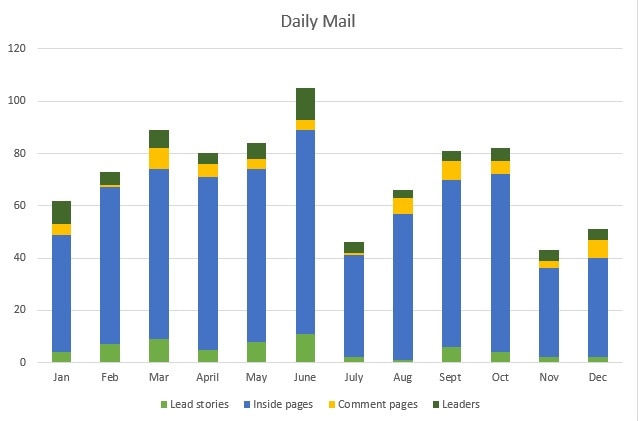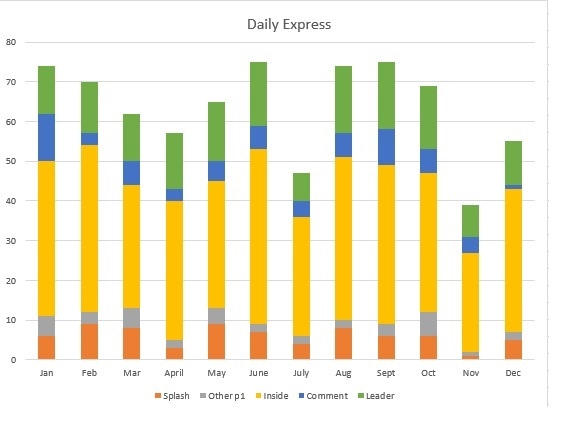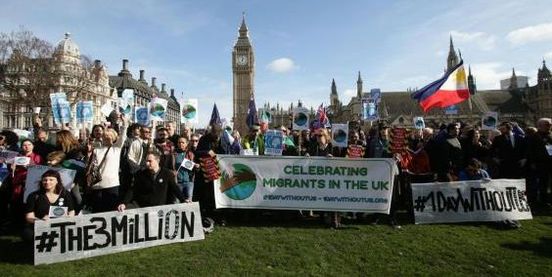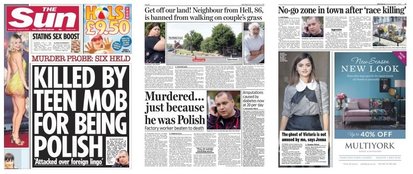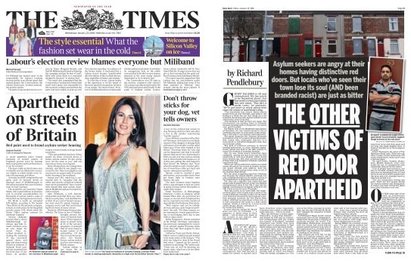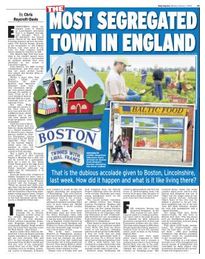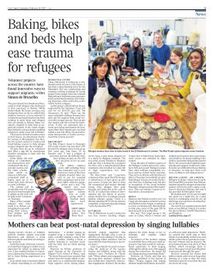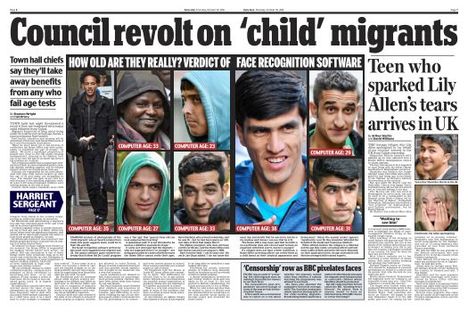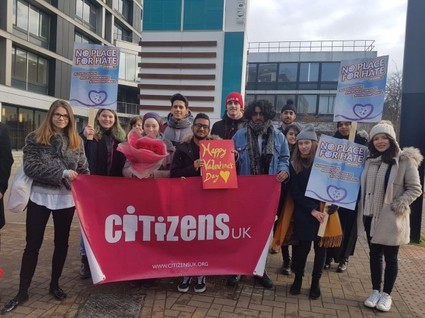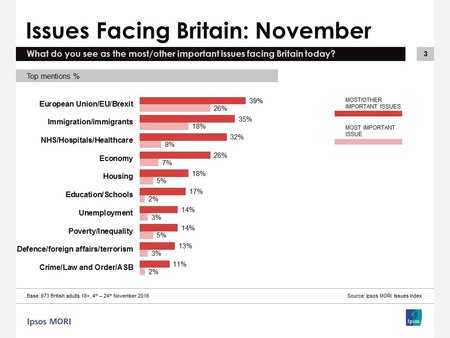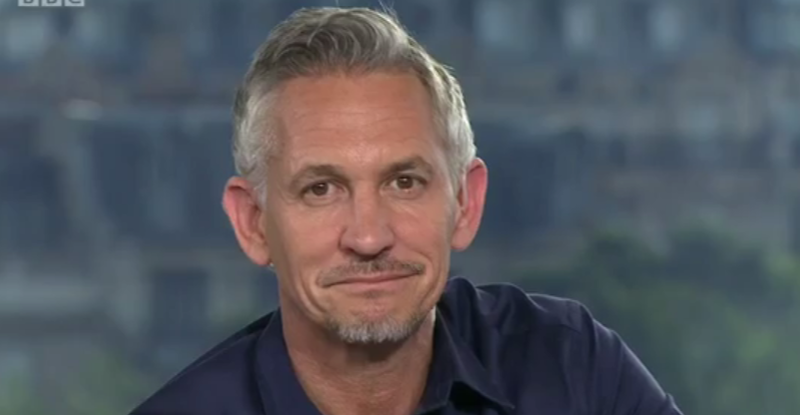A year of immigration in the white-topsImmigration was, by all accounts, the deciding factor in the EU referendum. Warnings about the economy, promises of £350m for the health service, even bendy bananas played their part. But nothing pushed the voters’ buttons as much as the idea of more people landing on our shores.
Pro-Brexit newspapers recognised as much, and fed and nourished their concerns – and have continued to do so in the push towards Article 50. Are they being responsible, telling voters what they need to know or abusing vulnerable people to secure the outcome they want? When does legitimate campaigning become a vendetta? Where and who draws the line on what is acceptable? Last September, SubScribe looked at the prevalence and tone of anti-immigration stories produced by Fleet Street, accompanied by a bar chart of front pages. At the time there were 195. By the end of the year, there were 277, with more than half coming from two newspapers – the Daily Mail and the Daily Express.
That original study dealt only with stories relating to immigration and a rash promise was made to update with further analysis. SubScribe has now looked at all of last year’s coverage of immigration, race relations and the treatment of foreigners (with some exceptions, detailed on the right) by those two papers. It was not a happy exercise. Between them, they printed 1,768 pages that included at least one such story, making an average of more than three per issue for the Mail and two for the Express (which has far fewer news pages). If every page were laid side by side, they would stretch for a third of a mile.
With the exception of Afghan interpreters being denied entry to the UK and some elderly white South African women facing deportation, the coverage was overwhelmingly negative, rising through the spring to a peak just before the referendum (six pages devoted entirely to migration in the Mail, five in the Express on the day before polling). It then fell away sharply, only to rise again when the first child refugees arrived from Calais and the Jungle was dismantled. The Sun, which came a distant third in the page 1 league with 23, averaged one per issue. It is every bit as hostile as the white-tops - one reporter told SubScribe that there was a buoyant market for stories about foreigners committing crimes in the run-up to the referendum - but the difference is that it tended to report only political big hitters and official statistics and to tell each story just the once. The Mail would return to an issue again and again (three goes at the landlord housing 31 migrant tenants in one property), while the Express would report the opinion of anyone who happened to share its anti-EU, anti-immigration agenda. “Scandals” included foreign crooks we could not deport, women putting intolerable strain on the health service by giving birth, children cramming into overcrowded schools. Then there were side issues such as burkinis and an insistence that anyone coming here should learn the language first (imagine the outcry if France demanded that Mail readers spoke French before buying their bargain chateau in Provence).
Europe was held to blame for almost everything, even though fewer than half of the immigrants who arrived last year came from the EU. Great play was made of the pressures on the health service – and on the threats to patient safety posed by foreign doctors – but not of the contribution to the NHS of its 130,000 foreign staff. (Neither paper reported Monday’s “One day without us” day of action to celebrate immigrants’ contribution to British life.) The vast majority of the stories examined were about the sheer scale of immigration and the structural and political fallout of coping with so many people. Politicians and campaigners with an outrageous number to publicise had no difficulty in finding reporters with open notebooks and pencils at the ready. Further ammunition came from across Europe, especially Germany, where Angela Merkel’s discomfiture is regarded as deserved retribution for the folly of her open-arms policy towards refugees.
The Express does not greatly trouble itself with world news – apart from the rise of Donald Trump – and its readers may be unfamiliar with what is going on in Aleppo or Mosul. But they know all about gang rapes and rioting in Swedish asylum centres. When neo-Nazis attacked refugees in Germany, the paper was happy to report the clashes – and left the reader in no doubt as to who was to blame for being there in the first place. The Mail is equally sceptical about many of the people making their way through Africa and Europe to Calais, but it has at least sent writers to report in some depth about the situation in Syria, Libya and across the EU, and the plight of those caught up in wars for which the West bears some responsibility. The cash-strapped Express relies almost exclusively on agency copy and ad-hoc stringers. Between a quarter and a third of the articles dealt with related issues such as Muslim integration, health tourism and crime. Crime dominated, with particular emphasis on murder, rape and other sexual assaults (as you'd expect). In almost every instance, the “outsider” was the perpetrator.
Only four killings were noted where the victim was a member of a minority - but so were three of their attackers.Two were Muslims - an imam and a shopkeeper who had wished his Christian neighbours a happy Easter - murdered by "Islamic fanatics"; a third was a Pole killed by an Albanian. The fourth victim was Arkadiusz Jóźwik, who was killed in Harlow in August. The Sun led on the story under the headline “Killed for being Polish”. The Mail put it on page 23. The Express did not run the story, but the next day it told readers about a “no-go area” after “race killing”. A teenager has since been charged with manslaughter. Both white-tops noted a rise in the number of anti-Semitic attacks [quite apart from extensive coverage of the Labour party’s travails, which were not counted in this exercise]; less well-documented were statistics pointing to a post-referendum surge in hate crimes against other groups. The Mail managed two two-paragraph stories – and a double-page spread by Guy Adams rubbishing the idea that there had been any increase. (The Sun carried a similar debunking column.)
In January, Andrew Norfolk described in the Times how asylum-seekers in Middlesbrough were being accommodated in houses whose doors were all painted red, a situation that made them sitting ducks for racist attacks. It was followed up everywhere, including by the Express and the Mail, which said it had chilling echoes of Nazi Germany. The day after that, the Mail devoted a page to “the other victims of red door apartheid”.
These were members of the local white population who were unhappy that so many people had been sent to their area – one of the poorest in the country – and that they were being branded racist. It is a good piece. A few days later the Guardian reported that asylum-seekers in Cardiff were being required to wear brightly coloured wristbands at all times. Again, both the Express and Mail followed up, but this time it was the Express that came back with the “balance”: a comment page piece by Jonathan Foreman who described it as a “bogus scandal” demonstrating refugees’ “exalted sense of entitlement”. It may appear that “balance” is offered only when the original material shows the minority group at a disadvantage, and that perception is reinforced by the attitude towards the existing Muslim community. Stories abound about burkas, sharia law, segregated swimming lessons and a general failure to adopt “British” ways; indeed some people are said to be so isolated that they believe the UK to be an Islamic nation – even though Muslims make up less than 5% of the population. There is good copy to be had from school bus drivers stopping making the children on board wait while they pray at the roadside, or from exams being held early so that pupils fasting for Ramadan are not disadvantaged. But is it enlightening?
Where are the stories about the need for white Britons to offer a welcome – or about places where diverse groups rub along happily? The Express offered “Cosmopolitan Street”, which was fairly positive about 23 different nationalities living in one shopping parade (the Mail found 28, the Sun 29), but it paid much more attention to its two candidates for “the most segregated town in Britain” (Boston in February, Blackburn in November). Neither paper would contemplate commissioning a piece such as that by Simon de Bruxelles in the Times last week on projects around the country aimed at making the few child refugees accepted into Britain feel at home.
There are countless reports of ne'er-do-wells that we cannot (if EU citizens) or do not (through our own failings) deport, but few about those who are being deported, often unjustly and to dangerous areas. Examples this week include Irene Clennell and Shiromini Satkunarajah, neither of whom interested the Mail or Express. Nor do we see much about the heroes from minority groups. They are there – the newsagent who rescued a teenager from a knife attacker, the woman who took the full force of an out-of-control car to save her grandchildren. But we are left to guess their backgrounds from their names because race and religion shouldn’t be mentioned unless germane.
Quite right. So why were we told that the trucker who caused a pile-up while using his mobile was Romanian?
The Mail has been campaigning for tougher penalties against drivers who can’t put their phones down. Over the past year, a number of people have been killed by such drivers and the newspaper has been assiduous in reporting cases when they have come to court. The Romanian didn’t kill anyone and while non-fatal accidents are not usually national news, the photographs might been newsworthy in the context of the campaign. But what had his nationality to do with anything? Barely a week later, Tomasz Kroker was jailed for killing a mother and three children when he ploughed into standing traffic. When Kroker first appeared in court, the report was headlined “Polish trucker killed mum and children as he played on phone”. But when he was sentenced, the fact that he was Polish was not mentioned until the seventh paragraph. Progress? Possibly. Except that the next day the paper’s front page consisted of half a dozen photographs of men fiddling with their phones while driving lorries with overseas number plates – an object lesson in how to turn a valid safety campaign into an attack on foreigners.
Then there are the Albanian killers, the Somali rapists, the knife-wielding Croatian thugs. Those may be valid on public interest grounds because they’ve been “let in” or “cannot be deported”, but the Lithuanian girl who picked some wild mushrooms? the Lithuanian model who did drugs? the Romanian who tried and failed to mug a woman at a cashpoint? the Italian who set off a smoke alarm on a plane? Let’s pause over that last one: a man heading for Britain (perfectly legally) lit a cigarette and put it out when caught. He didn’t cause the flight to be delayed or diverted, and ended up being fined £250. That is newsworthy enough to make a national newspaper page lead? Yes, if you can put “migrant” in the headline.
And there’s another thing. The man in question had a job. Britons who turn up in court are generally described by their occupation, but foreigners never seem to be carpenters or teachers or shop assistants. They are “migrants” or “asylum-seekers” or identified by their country of birth. Even when a report is relatively sympathetic, race or religion is emphasised. In August a woman was questioned at Heathrow by police whose suspicions had been aroused by the Syrian art book she was reading. She was returning from her honeymoon, so a fair headline might have referred to her as a “bride” or “newlywed”, but no – it had to be “Muslim girl detained…”. Newspapers must be free to exercise news judgment, to determine what is most important, what will most interest their readers, but those that elect to be regulated by the Independent Press Standards Organisation – as both the Mail and the Express do – are expected to abide by the Editors’ Code.
Clause 12 of the code says that the Press should avoid “prejudicial reference” to an individual’s race, colour, religion, gender, sexual orientation, illness or disability, adding that such details must be avoided unless “genuinely relevant”. The problem with this clause is that only the person being written about can complain. There is no provision for people to protest about discrimination against groups or whole sections of society. That is why complaints against Katie Hopkins’s notorious “cockroaches” column were rejected. Clause 6 of the code deals with the treatment of children and states:
“A child under 16 must not be interviewed or photographed on issues involving their own or another child’s welfare unless a custodial parent or similarly responsible adult consents.” As SubScribe noted a couple of weeks ago, the Mail took a compassionate line towards allowing orphans from the Calais Jungle to enter Britain – until the first few arrived. In common with other newspapers, it then carried photographs of the refugees again and again, speculating that they were not only over 16, but adults. It even mocked the Guardian and the BBC in a leader for pixelating the pictures. The number one rule in the book demands accuracy and that a clear distinction is made between fact, comment and conjecture. The first is relatively easy to obey, even if you want to project a particular idea: Richard Tice of Leave Means Leave does a back-of-the-envelope calculation and concludes that a million immigrants will land in Britain before Brexit. He shows his workings to a Daily Express reporter who writes up the story. The calculation could be spot on or wildly out, but either way the paper can argue that it has accurately reported what Mr Tice had to say.
As to keeping fact and comment separate, adjudications on complaints over the past year suggest that Ipso accepts that tabloid headings tend to be a statement of what the paper thinks rather than a precis of a collection of facts printed underneath.  Sir Alan Moses: "frustrated" Sir Alan Moses: "frustrated"
Citizens UK, which works with communities and helps refugees to settle here, has been greatly concerned about the coverage of minorities and has asked Ipso chairman Sir Alan Moses to set up an investigation. Last month it held its second meeting with Moses, presenting him with dozens of front pages, leaders and opinion columns showing immigrants in a negative light.
Sir Alan is not happy with the tone of some of some newspapers’ reporting and has said as much publicly more than once. On this occasion he described the material on the table as “a mass of disparaging reporting all mixed up into a general prejudicial picture”, but he said: This is where it gets really difficult. We cannot investigate a whole series of reports just because they are prejudicial. The police can, but they are feeble. The [hate crime] legislation doesn’t require intention to be proved. But they don’t bother.” As to Ipso’s capacity to respond, he said: “There is no rule that requires the Press to avoid prejudice. How do you draft such a rule?” The public were continuing to absorb deliberately prejudicial stories and subtle references to religion when not relevant, he said, and those disseminating them needed to be confronted. But the editors’ code, as it stood, left him powerless to rein papers in:
“I am incredibly conscious of the disappointment I almost daily cause to you and your colleagues. I am frustrated and ashamed, but that won’t make me give up.” Following on from Sir Alan’s suggestion that the police were in a better position to do something, the Police Chiefs’ National Council was invited to comment on whether forces felt able - or were minded - to act against newspapers. The response was to send a copy of the 140-page guidance on the law and to say that it was down to the Crown Prosecution Service to make decisions on a case-by-case basis.
 Miqdaad Versi: complaints Miqdaad Versi: complaints
Citizens UK has taken heart from Ipso’s willingness to discuss the issue, but there was anger and frustration after last month’s meeting at the apparent reluctance to launch an inquiry – it can do so without any formal complaint, if it believes an issue to be serious enough. The group is now compiling a detailed report at Sir Alan’s request and has also recruited a small team to monitor newspapers and submit complaints under the existing procedure.
Miqdaad Versi, assistant secretary general of the Muslim Council, is already doing that – in the same way that InFacts did with referendum coverage – and he has secured 19 corrections and apologies over the past three months. His successes include a ruling last week against Ipso board member Trevor Kavanagh over a comment column in the Sun in which he said that two in three child immigrants lied about their age - which was patently not true. Kavanagh was also rebuked for undermining Ipso in a sidebar to that column where he attacked the Channel 4 newsreader Fatima Manji. Versi's complaint in that case was rejected, but Ipso issued a statement saying: “IPSO is committed to ensuring that individuals who believe that they have been wronged by the press are able to seek proper redress without fear of retribution or victimisation. In this instance, public comments by an IPSO board member brought the strength of this commitment into question. This should not have happened. The board has received an apology from the board member and an assurance that it will not happen again.” Versi was not impressed by the statement or by the length of time it took to issue it, and he has joined a growing chorus calling for Kavanagh to go, telling The Guardian: .
“I recognise the theoretical value of having a journalist on Ipso’s board but is it too much to ask that the journalist is known to be responsible for their actions? Versi is also frustrated by Ipso’s call for more evidence before it can take matters further:
"For Ipso to gain greater confidence of communities, three key changes are needed: a stronger willingness to investigate the consistent breach of basic standards by national newspapers, equal prominence for corrections and a stronger code that reflects the recommendations of Lord Leveson's inquiry." Versi is less sure about Moses's suggestion that the police could act against an accumulation of prejudicial articles, where Ipso says it is powerless. He says that it would have to be the right case to have a chance of success, and that the wrong one might risk undermining public support for law against racial hatred.
Elsewhere, Stop Funding Hate, which wants advertisers to abandon papers that “demonise” sections of society, scored a big hit with the Body Shop’s announcement that it would no longer advertise in the Mail – a decision taken after Citizens UK’s youth campaign group Stand Up Stand Out delivered a “spread love not hate” Valentine’s message to the company’s headquarters.
A momentum is slowly building. The SFH campaign in particular is being heard. And loudly enough for the Mail to take a swipe at it in a leader last month saying: “A more malicious threat comes from Left-wing campaigners who seek to blackmail firms into withdrawing advertising from newspapers with which they disagree. The main target of that leader was Section 40, a law that might force newspapers not signed up to a state-approved regulator to pay both sides costs in any court action, win or lose. A public consultation on whether the law should be put into effect closed last month. In the final weeks, most national newspapers ran leaders urging readers to defend the free Press. The Mail also carried full-page house ads almost daily to hammer the message home.
As it happens, another consultation exercise relating to Press regulation is under way – one that has received far less, if any, publicity. The Editors’ Code, which was put together by a committee under the chairmanship of Mail editor Paul Dacre, is being reviewed and the public are invited to make submissions on how it might be improved. The closing date is this Friday, March 3*. Dacre has gone after years of overseeing the code for Ipso and its discredited predecessor the PCC. Ipso is entering a new era and this is an opportunity for people who think that Press behaviour is beyond the pale to help to rewrite the rulebook. It’s not an easy task: people might look at the sort of coverage detailed above and say “something should be done”, but what? Papers have to be free to campaign, so repeatedly returning to the same issue has to be acceptable. Who is to say how often is too often? With regard to immigration, the Mail and Express may reasonably point to successive opinion polls supporting the view that it is what readers worry about most. In its latest “issues that concern voters” survey, Ipsos-Mori found that 35% of interviewees mentioned immigration, compared with 39% for the EU, which came top, and 32% citing the NHS. However, only 18% saw it as THE most important issue and at no point last year did a majority of respondents mention it at all. It is always hard to determine whether newspapers are reflecting or fuelling public anxieties. In running campaigns, news editors are aware that readers tire of the same old, same old and ease up before people turn off. But, far from tiring of these immigration stories, readers seem actively to be encouraging them – just look at the below-the-line comments on any website.
It’s a vicious circle. *Submissions for the consultation on the Editors’ Code can be sent via the editorscode.org.uk website, by email to codereview2017@gmail.com or by post to Editors’ Code of Practice Committee, c/o News Media Association, 292 Vauxhall Bridge Road, London SW1V 1AE. And for the record, here's the Sun's output |
|
MethodologyThis analysis is of 2016 coverage of immigration, minority communities and “foreigners”, excluding anything directly related to Isis, terrorism and war.
Thus a story about the financing of jihadis or terror attacks would not feature, but vague links such as “open borders let in terrorists” would. Coverage of the Labour Party and anti-semitism is also excluded, but anti-Semitic attacks on individuals have been logged. The audit of “inside pages” is the count of all news pages that included a story meeting the criteria above, with a spread counting as one page. Each page (or spread) counts as one, regardless of how many stories featured on it or how small the news item. In categorising stories, all coverage of the Jungle, asylum centres, open borders, EU policy and the movement of people has been logged under “migration”. Articles about how individuals behave once settled in their new country have been separated out. This means that the Cologne sex attacks, for example, count as “migration”, while a story about a particular asylum seeker accused of murder would count as “crime”. Similarly, stories about immigration in general putting a strain on schools or hospitals count as “migration”, whereas stories about EU students dodging tuition fees or health tourism do not. Stories about individuals are included only where race or religion is highlighted in the heading or the first two pars. Reports, such as those about Tomasz Kroker, which mention nationality in passing in the fifth or sixth par don't count. Apart from SubScribe's comments on petty criminals, no opinions are offered on the newsworthiness of any particular story. It is for readers to judge what is reasonable. That is the point of the research. Thank you. The numbersAccording to the Daily Mail
3,000
Migrants to be held in Dunkirk’s “new Sangatte” (Jan 2) 100,000 Fewer migrants would arrive in UK after Brexit (Jan 27) 90,000 Refugees EU wants Britain to take every year (Jan 31) 2,000 Land on Greek islands every day (Feb 2) 70,000 Flee Syria (Feb 6) 3m More migrants to come (Feb 10) 45% increase in convictions of EU migrants in five years (Feb 17) 3m UK workers are foreign (Feb 18) 5,000 Jihadis at large (Feb 20) 6,000 Migrants land in Greece in three days (Feb 20) 2m Migrants let in by Blair (Feb 27) 1.25m Asylum seekers arrive in Britain in a year (Mar 5) 123% increase in asylum claims since 2014 (Mar 5) 1,200% increase in attempts to reach the UK illegally since 2013 (Mar 9) 450,000 On way to Europe from Libya (Mar 17) 77m Turks to get visa-free access to Europe (Mar 19) 1.6m From EU settle in Britain (Mar 30) 80m UK population in 25 years (Mar 31) 6,000 At home in Greek ferry terminal (Mar 31) 900 No-go areas in EU created by migration (Apr 2) 3m New arrivals in Osborne’s migration bombshell (Apr 19) 27% increase in refugees given asylum in a year (Apr 21) 1,000 Criminals who should have been deported (Apr 26) 10% how much more crowded Britain has become thanks to mass migration Apr 29) 88m To be offered open door by EU, says Gove (April 30) 90,000 Children enter EU on their own in a year (May 3) 5m EU migrants on the way, says Gove May 21) 2,600 Migrants picked up en route to Europe (May 25) 4m Predicted rise in UK population in eight years (May 26) 6,000 Migrants picked up in Mediterranean May 26) 270,000 EU nationals came to Britain in 2015 (May 27) 12,000 Migrants saved from sea (May 27) 700 Feared drowned (May 30) £1,000 Per migrant paid to French fishermen (May 31) 3,500 Migrants sent ballot papers in EU vote fiasco (Jun 4) 250 Foreign lifers we haven’t kicked out Jun 4) 2,500 Migrants cleared out of Paris “jungle” (June 7) 30,000 Get into Britain as spouse of EU citizen (June 8) 3 Boats guard our borders – Italy has 600 (June 9) 2m From Europe in 10 years – official June 10) 1 Migrant caught trying to sneak into UK every six minutes (June 11) 1.5m Turks to be let into Britain in No 10 plot (June 13) 13m Increase in UK population in 20 years (June 14) 570,000 More EU pupils in our schools by 2030 (June 22) 500,000 Increase in population thanks to migrants (June 24) 25% Increase in “titan” primary schools because of migration (June 26) 4,500 Migrants rescued from Med (July 7) 1,400 Refugees stranded on Hungarian border July 15) 800,000 Poles Theresa May wants to be allowed to stay in Britain (July 29) 1m Illegal migrants who may be in UK (Aug 4) 31 Migrants living in one house (July 29, Aug 5 and Aug 6) 2,000 Join Jungle camp in a month (Aug 13) 1m Workers in UK come from Eastern Europe (Aug 18) 25% Of babies are born to migrant mothers (Aug 26) 25 Illegals seized every day (Aug 31) 20,000 Syrian refugees to be settled in Britain (Sep 5) 11,000 Migrants saved from Med in two days (Oct 6) 5,000 “Child” migrants are adults (Oct 22) £36m Taxpayers’ bill for Calais clearout (Oct 26) 1,300 Foreign criminals use Human Rights Act to stay in UK (Nov 16) £2bn Cost to NHS of treating foreigners (Nov 24) 70% Newborns in London with at least one foreign parent (Dec 1) 2m EU citizens working in Britain (Dec 2) 51 Languages on Manchester road signs (Dec 6) £5,000 Fare for being smuggled to UK in a Lidl van (Dec 16 ) £30m Cost of one year’s health tourism (Dec 20) ...and according to the Daily Express
5,000
asylum claims in a month (Jan 7) 1,700 arrive in EU every day (Jan 16) 2m grab our jobs (Feb 18 1 migrant sneaks into Britain every eight minutes (Feb 23) 2,000 arrive in EU every day (Feb 24) 1.2m claim asylum in EU in a year (Mar 5) 300 jihadists on our streets(Mar 24) £1.3bn cost to NHS of migrant mothers (Apr 2) 1.8m enter EU in a year Apr 6) 79m from Turkey face open door to EU (May 5) 1.5m Britain’s hidden migrants (May 13) £3bn annual cost of teaching migrant children May 16) £17bn a year cost to Britain of migrants (May 17) 229,000 from EU find work in UK in a year (May 19) 5m influx if we stay in EU, says Gove (May 21) 330,000 net migration to UK in a year (May 27) £100 Fare to invade Britain (Jun 1) 1 illegal sneaks into Britain every six minutes (Jun 10) 5m new EU citizens have right to enter UK (Jun 14) 111 seek asylum every day (Jun 17) £29bn bill to teach migrant children over next four years (Jun 22) 227,000 migrants enter EU in six months (Jul 6) 2m EU population increase from non-stop flow of migrants (Jul 9) 1m illegal immigrants living in Britain (Aug 4) 10,000 asylum seekers missing in new migrant shambles (Aug 6) 84,000 asylum seekers playing the system (Aug 16) 2.2m EU migrants work in Britain (Aug 18) 200 smuggled into UK by lorry every week Aug 29) 12,000 asylum seekers vanish (Sep 28) 1m illegal immigrants in UK (Oct 8) 3 illegals an hour sneak into Britain (Oct 24) £160m UK sends to Europe in child benefit (Oct 29) 1,300 dodge deportation over right to family life Nov 16) 119,000 illegal migrants disappear (Nov 19) £30m cost to NHS of cheating foreign patients (Dec 20) 2016 in fullJanuary
February
March
April
May
June
July
August
September
October
November
December
|
Related stories
How you can be a SubScriber
|
Sign up for email updates (no spam, about one a month)...
|
|
...make a financial contribution
I'd like to subscribe
There will never be a charge for reading SubScribe,
but if you would like to make a donation to keep it going, you can do so in a variety of ways by pressing this button. Thank you. |

